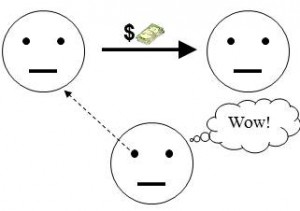Research
My research expertise is on human cooperation, the reasons for its existence, and the psychological mechanisms that underlie cooperative action. In particular, I investigate the importance of reputation within human social relationships, including competition over a reputation for generosity (i.e., competitive altruism). As an evolutionary psychologist, my research draws from evolutionary biology, animal behaviour, mathematical game theory, experimental and behavioural economics, anthropology, social psychology, and cognitive psychology. By using this approach, my research tries to understand when and why people help others, what design features in the brain promote generosity, what selective pressures could have resulted in the brain being designed this way, and how we can harness this knowledge to promote cooperation in domains as broad as workplaces, environmentalism, and charities.
My research typically uses games from behavioural economics (such as the well-known Prisoner’s Dilemma and public goods games) where participants can make decisions with money to benefit themselves, others, or both. We then run these experiments in our lab or online (e.g., MTurk). I often complement these experiments with mathematical models (evolutionary game theory) to advance our theoretical understanding of cooperation.
In addition to my research on cooperation and prosocial behaviour, I also have a secondary line of research on risk-taking.
Want more details? Click here for more info on specific lines of research
Want a video? Check out my keynote talk at the University of Toronto Symposium on the Mind (UTISM) in 2012, or my talk at TEDxGuelphU 2017.
You can also see my CV, or my Google Scholar profile.
SELECTED PUBLICATIONS
These are for personal use only and not for commercial use or redistribution. An asterisk (*) indicates a student or post-doc in my lab at the time of the work.
SELECTED THEORETICAL OR REVIEW ARTICLES
*Mishra, S., Barclay, P., & *Sparks. (2017). The relative state model: Integrating need-based and ability-based pathways to risk-taking. Personality and Social Psychological Review, 21(2), 176-198. [LINK] [PDF]
Barclay, P. (2016). Biological markets and the effects of partner choice on cooperation and friendship. Current Opinion in Psychology, 7, 33-38. [LINK] [PDF]
Barclay, P. (2015). Reputation. In D. Buss (Ed.) Handbook of Evolutionary Psychology (2nd Ed.), pp. 818-828. Hoboken, NJ: J. Wiley & Sons. [PDF]
Barclay, P., & Van Vugt, M. (2015). The evolutionary psychology of human prosociality: adaptations, mistakes, and byproducts. In D. Schroeder & W. Graziano (Eds.) Oxford Handbook of Prosocial Behavior, pp. 37-60. Oxford, UK: Oxford University Press. [PDF]
Barclay, P. (2013). Strategies for cooperation in biological markets, especially for humans. Evolution & Human Behavior, 34(3), 164-175. [LINK] [PDF]
Barclay, P. (2012). Harnessing the power of reputation: strengths and limits for promoting cooperative behaviours. Evolutionary Psychology, 10(5), 868-883. [LINK][PDF]
SELECTED EMPIRICAL PUBLICATIONS
*Pleasant, A., & Barclay, P. (in press). Mutual cooperation gives you a stake in your partner’s welfare – especially if they’re irreplaceable. Forthcoming in Journal of Personality & Social Psychology. [LINK][PDF]
Barclay, P., & Barker, J.L. (2020). Greener than thou: people who protect the environment are more cooperative, compete to be environmental, and benefit from reputation. Journal of Environmental Psychology, 72, 101441. [LINK][PDF]
*Pleasant, A., & Barclay, P. (2018). Why hate the good guy? Antisocial punishment of high cooperators is higher when people compete to be chosen. Psychological Science, 29(6), 868-876. [LINK]
Barclay, P., & *Stoller, B. (2014). Local competition sparks concern for fairness in the ultimatum game. Biology Letters, 10, 20140213. [LINK] [PDF]
Barclay, P., & Willer, R. (2007). Partner choice creates competitive altruism in humans. Proceedings of the Royal Society of London Series B, 274, 749-753. [LINK] [PDF]
Barclay, P. (2006). Reputational benefits for altruistic punishment. Evolution and Human Behavior, 27, 325-344. [LINK] [PDF]
